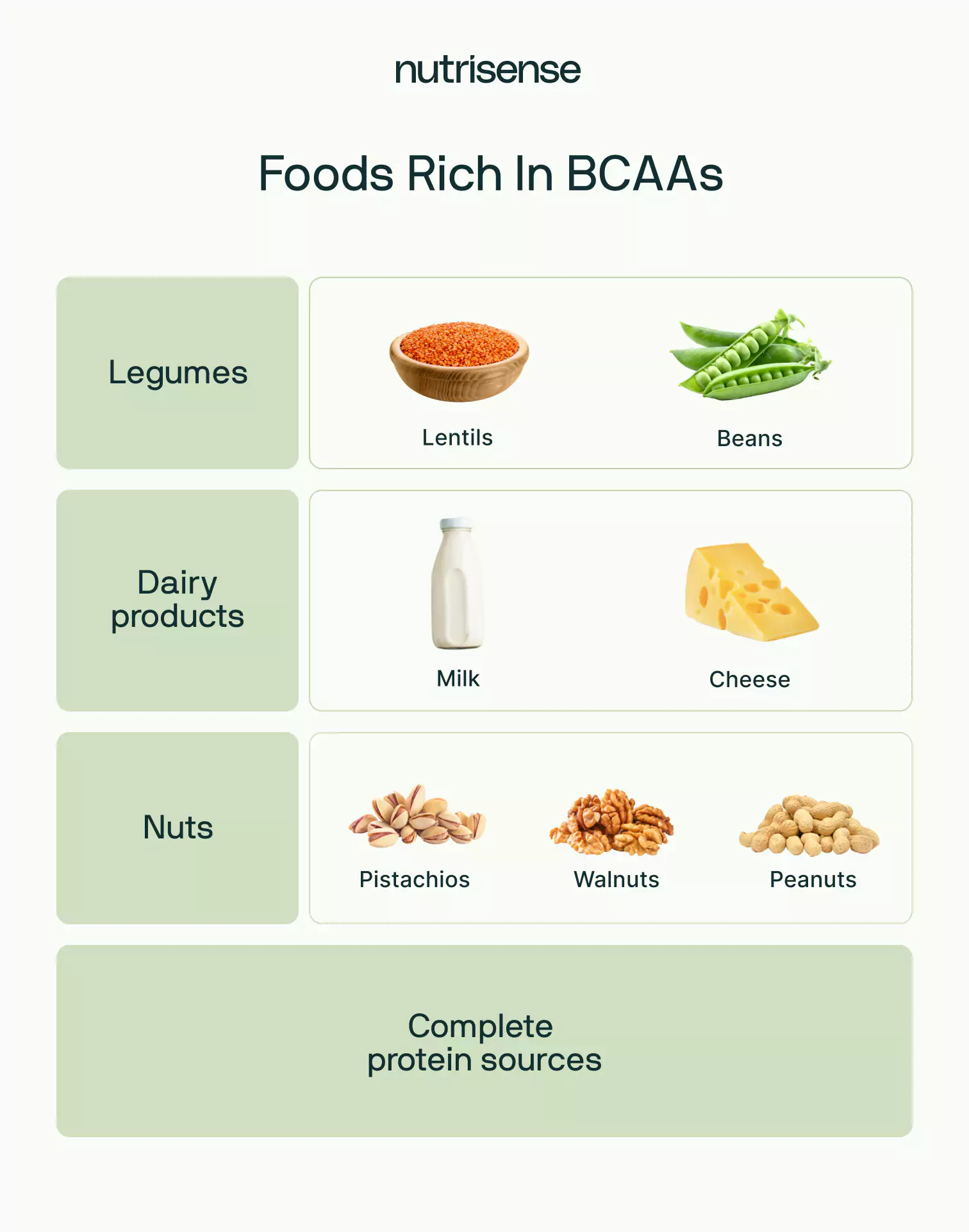Are BCAAs Worth It? The Bottom Line on Branched-Chain Amino Acids

Key Takeaways
You likely know how important a healthy whole-food diet is. Ensuring enough protein is vital for gym-goers looking to build muscle, get stronger, or lose weight. Protein, rich in amino acids—the building blocks of muscle—is key for athletes and fitness enthusiasts and is often used as a pre-workout dietary supplement or fat-loss aid.
But did you know there's a specific group of amino acids called BCAAs (branched-chain amino acids) that are often considered the gold standard for muscle-building? Are they worth the hype, or are the effects of BCAAs overhyped? Read on to find out what the science says.
What are Branched-Chain Amino Acids?

There are 20 different amino acids, nine of which are considered essential. Unlike non-essential amino acids, essential amino acids are those your body can't produce, so you must get them from dietary sources.
Three of the nine essential amino acids are BCAAs, a specific group of amino acids that get their name from their branched-chain structure. This group of amino acids includes:
- Valine
- Leucine
- Isoleucine
To grow muscle, the rate at which your body builds muscle fibers has to be greater than the rate of muscle protein breakdown. And, yes, a little bit of muscle breakdown is a healthy physiological process, as the amino acids from this breakdown are used by different tissues and organs of the body for various uses.
A lot of factors influence this rate. One of them is protein intake.
So, if you're eating a lot of protein (we'll discuss what 'a lot' means later in this post), your muscle fibers are getting 'fed,' which will speed up the rate at which they grow.
And that rate would be greater than how fast your muscle fibers are broken down. That means more muscle synthesis (or growth).
It all seems straightforward. But there may be more than meets the eye.
Some Benefits of BCAAs for Your Health
Some research suggests that BCAAs, more than any other amino acid, have a unique ability to speed or boost muscle synthesis.
Research also suggests that BCAAs play a role in preventing muscle damage, helping muscle soreness, and improving metabolic health. But how much of this is true? What role do they play in muscle growth and muscle mass? And where do BCAA supplements fit in regarding athletic performance and recovery? Let's take a closer look.
BCAAs and Muscle Building

Research has long suggested that BCAAs may aid muscle growth, but findings are nuanced. Early studies in rats (like this one from the 80s) hinted at their importance, though human muscle synthesis differs significantly. Later research showed BCAAs might boost muscle building post-exercise, but only when combined with all nine essential amino acids (EAAs).
Without all EAAs, the body cannot sustain muscle protein synthesis, as supported by a study in the Journal of the International Society of Sports Nutrition. Relying on BCAAs alone leaves six EAAs unaddressed, causing the body to pull amino acids from muscle tissue instead. Studies from 1990 and 1995 confirmed this, highlighting the need for a complete amino acid profile for optimal muscle growth. Here's the breakdown:
- The studies found that consumption of BCAAs alone increased muscle breakdown.
- They experimented with different concentrations of BCAAs and found this result accurate even when the concentration of BCAAs was eight times higher than the initial concentration.
- The idea that BCAAs boost muscle growth stems from research suggesting that these amino acids kickstart a 'muscle-building' process in muscle cells upon initial breakdown during digestion.
- However, despite this initial signaling, muscle protein synthesis is still reduced when other essential amino acids aren't included.
- You can only build muscle if you have enough essential amino acids to finish the process and create a complete protein for muscle tissues to use. The rest of the body will also use these essential amino acids for their functions instead of pulling them from muscle tissue.
The result is that you'll have an increased rate of muscle building. So, you need all essential amino acids for muscle growth, and focusing only on BCAAs will have the opposite effect.
BCAAs' Synergy With Complete Protein Sources
Did you know pairing BCAAs with complete protein sources amplifies muscle protein synthesis? One study showed that adding 5g of BCAAs to 6g of whey protein (a complete protein source) produced the same muscle-building effect as 25g of whey alone.
This suggests that supplementing with BCAAs can achieve similar results with less protein. However, BCAAs aren't a magic solution to building muscle. Remember to prioritize complete protein sources to get all essential amino acids, and then consider adding BCAA-rich foods (see some examples later on in this piece!) to enhance the process.
BCAAs and Muscle Soreness
Experiencing DOMS (also known as muscle fever) and waking up with extremely sore muscles the day after an aerobic activity or weight training day is no fun.
One of BCAAs' health benefits is reducing soreness. However, the research is mixed, suggesting that BCAAs can help with muscle soreness if people consume less protein than the recommended amount.
The confounding results make it unclear if BCAAs directly help with muscle soreness or if adding them to low-protein diets helps reduce muscle soreness.
The study mentioned above controlled for dietary protein intake and found that people who consumed BCAAs reported less muscle soreness 24 and 72 hours after their workout than those who didn't take BCAAs or took placebos. As a result, their exercise performance will show better results.
There may be one 'special property' that makes BCAA especially beneficial for healing muscle soreness, and that's related to inflammation. Any intense aerobic or resistance exercise can temporarily increase inflammation, contributing to muscle fever.
Here's where BCAAs come in. When you take BCAAs after a regular workout, your body can use this group of amino acids to create a molecule called glutamine. Glutamine is taken up by inflammatory cells. And when it is, it helps reduce inflammation in your body.
Leucine, one of the BCAAs, may be especially effective at reducing inflammation and, in turn, muscle soreness.
The results are mixed. Some research suggests getting whole protein sources, while others say specific amino acids that aren't BCAAs, like L-carnitine, may be the key to reducing muscle fever.
However, when it comes to muscle soreness, there's more to it than simply consuming BCAAs. If you haven't already, check out our in-depth post on foods to improve post-workout muscle fever.
BCAAs and Metabolic Health
Did you know that people who are obese have 20 percent higher levels of BCAAs compared to those who are lean?
What this means is that those who are obese may have more trouble breaking down and using beneficial branched-chain amino acid catabolism for muscle building and other functions. Instead, it may adversely affect cardiovascular health and cause coronary artery disease.
Even more interesting is that gut health and the inability to break down and use BCAAs properly are associated with insulin resistance.
Upon further examination, researchers have discovered that high levels of valine are linked to the risk of type 2 diabetes, and a higher level of leucine significantly helps reduce the risk of type 2 diabetes.
While isoleucine may not cause adverse effects on insulin resistance, animal model studies have shown that a diet low in this specific amino acid could prolong lifespan and enhance overall metabolic health, particularly among older males.
However, when given without consideration for the person's metabolic health, BCAAs are associated with an increased body percent fat, especially if on a high protein, low carbohydrate diet. Plus, taking BCAAs when your diet has too much or too little overall protein compared to carbs increases insulin levels.
All in all, this suggests that BCAAs aren’t a blanket solution for metabolic health. Nutrition is complicated, and we need to consider a person’s overall diet (including macronutrients) to determine if BCAAs will be helpful. If you work with a registered dietitian or nutritionist, this would be a great conversation with them, as they’d be able to suggest if consuming more BCAAs is the right choice for you.
Do You Need BCAAs for Your Workouts?

No, you don't need BCAAs for your workouts, but they can be helpful for significant muscle building and DOMS when part of a protein-rich diet. Regarding metabolic health, you may want to exercise caution and discuss with your nutritionist if BCAAs are right for you.
If there's one thing you can take away from this article, it's that there is no magic wand to boost your fitness, lose weight, or improve your health.
Consider BCAAs in light of your overall diet and protein intake. Remember that you want to focus more on consuming complete protein sources instead of just BCAAs. And balance that protein with carbs and fat, focusing on the right portions for your needs.
The Recommended Amount of BCAAs
There isn't a gold standard for how many BCAAs you should get. Based on the study done with whey protein and BCAAs, an excellent place to start would be to add a few grams of BCAAs (as a protein powder) to a diet rich in complete protein. But the most effective strategy is to focus on consuming whole food protein sources, as they're already rich in BCAAs!
When it comes to adequate protein consumption, here's what the research recommends (remember, all of this may vary based on numerous factors (physical activity levels, gender, age, life stage, and so on):
- Adults should consume at least 0.8 grams of protein per kg of body weight per day at the very least (this is the bare minimum, and most people need more than this; see points below).
- To build and strengthen muscle, adults with minimal physical activity should consume 1 gram of protein per kg of body weight.
- For muscle building and strength, 1.3 grams of protein/kg of body weight for adults with moderate physical activity.
- Adults who engage in intense physical activity should consume 1.6 grams of protein per kg of body weight to build and strengthen muscle.
Complete Protein Sources
Examples of whole-food protein sources that are considered complete protein include:
- Eggs
- Poultry (pasture-raised wherever possible) and some red meat
- Some red meat (pasture-raised wherever possible)
- Organ meats
- Quinoa
- Dairy (milk, cheese, yogurt)
- Fish
- Soy (tofu, tempeh, edamame)
- Chia and hemp seeds
These all include essential amino acids for maximum muscle growth.
Foods Rich in BCAAs

Examples of BCAA-rich foods include:
- Legumes such as beans and lentils
- Dairy products such as milk and cheese
- Nuts such as pistachios, walnuts, and peanuts (technically considered a legume)
- Complete protein sources
Is There a Best Time to Take BCAAs?
To help reduce muscle soreness, you can consume a meal rich in BCAAs (and complete protein) after your workout. You can also focus on BCAA-rich snacks (such as a handful of nuts and cheese) throughout the day, with a few hours between the snacks for better digestion. Make sure to spread out your protein intake throughout the day.
If you have specific calorie needs, your nutritionist could help you develop snack ideas that fit these needs.
Other Tips to Get the Most Out of BCAAs
Our biggest tip is to consume BCAAs in complete protein sources and get enough essential amino acids. That's how you'll get that synergistic effect we discussed earlier in the post.
Branched-Chain Amino Acid Supplementation
Should you be consuming a BCAA supplement? Or are they a waste of money? Again, it's not absolutely necessary, especially for older individuals. Based on all the sports nutrition research discussed in this post, it's best to stick to complete protein sources to ensure you get enough essential amino acids.
You can add BCAA powder to a smoothie alongside a meal with complete protein to get that synergistic effect. If a protein food supplement isn't your cup of tea, focus on consuming foods that are complete protein sources, as they'll be rich in BCAAs and essential amino acids.
In most cases, a diet sufficient in complete protein and essential amino acids (alongside a great muscle-focused training program) effectively builds muscle.
Who Should Not Be Taking BCAAs

You should practice caution and discuss BCAAs and any health products with your nutritionist if any of the following applies to you:
- You are trying to improve insulin resistance and/ or glucose intolerance
- You're obese and want to lose weight
- You're predisposed to metabolic dysfunction and are concerned about consuming BCAAs because of that
You should avoid taking BCAAs and discuss with your healthcare provider if:
- You’re currently breastfeeding.
- You are at risk of or have cardiovascular disease, liver disease, kidney disease, or similar malfunctions.
- You have a condition that requires a low-protein diet (e.g., maple syrup urine disease, liver disease, hepatocellular carcinoma).
Find the right Nutrisense programto turn insight into progress.
Work with a Sports Dietitian to Understand BCAAs for Your Body
Curious about BCAAs and how they align with your fitness and health goals? Whether you’re focused on building muscle, managing weight, or improving metabolic health, Nutrisense can help you uncover what works best for your body, with access to the latest in health tech and 1:1 video calls with specialists like glucose-certified sports dietitians. By combining cutting-edge tools like continuous glucose monitoring (CGM) with personalized insights from a registered dietitian, Nutrisense gives you a deeper understanding of how your body responds to nutrition, exercise, and lifestyle changes.
Ready to optimize your health and fitness journey? Discover how Nutrisense can empower you to achieve your goals with data-driven insights and expert guidance. Get started today!
Go Beyond Glucose Data with Nutrisense
Your glucose can significantly impact how your body feels and functions. That’s why stable levels are an important factor in supporting overall wellbeing. But viewing glucose isn't enough. Nutrisense, you’ll be able to learn how to use your body's data to make informed lifestyle choices that support healthy living.
One-to-one coaching
Sign up to access insurance-covered video calls to work with a glucose expert: a personal registered dietitian or certified nutritionist who will help tailor your lifestyle and diet to your goals.
Monitor and measure what matters
With the Nutrisense CGM Program, you can monitor your glucose with health tech like glucose biosensors and continuous glucose monitor (CGM)s, and analyze the trends over time with the Nutrisense App. This will help you make the most informed choices about the foods you consume and their impact on your health.
Find your best fit
Ready to take the first step? Start with our quiz to find the right Nutrisense program to help you take control.

Amanda is a Nutrition Manager and Registered Dietitian, with a Masters in Dietetics from Stephen F. Austin State University. Originally from south GA, she got her undergrad degree from Texas Tech University. She worked at a hospital in Fort Worth, TX, for 4 years as a dietitian, counseling those living with HIV.

.webp)


